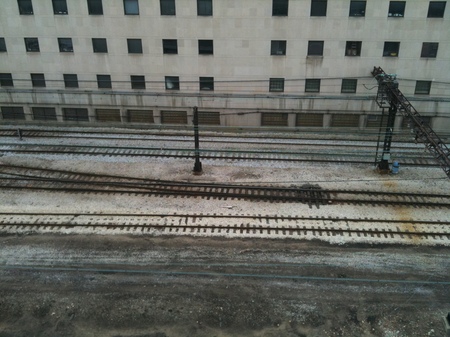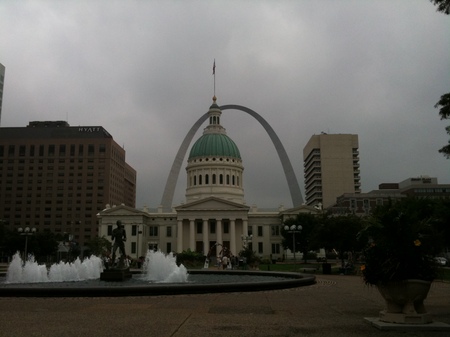| « In Case Of A Close Election | 2010 Primary Kudos » |
Public Transportation Wed Feb 03 2010
A Tale of Two Cities: High-Speed Rail Reactions
President Obama awarded $8 billion in high-speed rail grants to 31 states last week -- and the Midwest was not forgotten. The region was awarded $2.6 billion in total to build four major corridors: Chicago-St. Louis-Kansas City, Minneapolis-Milwaukee-Chicago, Cleveland-Columbus-Cincinnati, and Detroit-Chicago. In a fairly major victory, Illinois received $1.13 billion to look at the Chicago-St. Louis-Kansas City corridor (pdf). The money will look at phase one of the plan to improve tracks, signal systems, and existing stations on the current Amtrak line.
Two local articles -- one from the Chicago Tribune and one from the St. Louis Post-Dispatch -- highlight some important issues that legislators need to consider to ensure high-speed transit in the Midwest is successful.
In a nice analysis piece, the Chicago Tribune's Blair Kamin argues that stations and architecture need to be thoroughly thought out and planned in order for high-speed transit to have any impact on the average person's commute:
This isn't just fixing crumbling roads and bridges. It could revolutionize the way we move and live. But if a new order is to replace the old one, much more needs to be done than speeding up the trains. The entire passenger experience has to be thought through, from curb side to the train shed. If you doubt that, take a look at the mess in Union Station, the likely hub of Midwest high-speed rail.
Meanwhile downstate, the editorial board of the St. Louis Post-Dispatch ponders if $8 billion -- and the additional $5 billion promised -- will even make a dent in changing America's current infrastructure. When it comes to public transportation, St. Louis residents have few options but to rely on their car for almost every trip:
With apologies to futurists, people in the construction industry and rail buffs, investing $13 billion (or even $8 billion) in passenger railroads is a little like building a bridge to the 19th century. It's not enough money to make trains fast enough, attractive enough and affordable enough to attract sufficient passengers to operate without massive government subsidies....And perhaps we're being short-sighted: It could be that 50 years from now, America will be glad it invested in high-speed rail. But right now, there are far better, fairer and faster ways to stimulate the economy than spending $8 billion on the relatively affluent 1 percent of Americans who ride trains. Public transit immediately comes to mind. Missouri got $31 million to upgrade St. Louis-to-Kansas City service that served 150,000 passengers last year. The state also subsidizes those twice-daily trains with $5 million a year. Meanwhile, the Metro transit service in St. Louis -- which carried 353 times more passengers than the state's two Amtrak trains last year -- gets zero in state tax subsidies, though the Legislature last year appropriated $12 million in federal stimulus money to temporarily offset crippling transit cuts.














Howard Learner / February 4, 2010 9:44 AM
Investing in modern, fast, comfortable and convenient higher-speed rail service is a smart move towards better transportation infrastructure, not "short-sighted," as the Post-Dispatch's editorial worries. Better rail service will improve mobility, reduce pollution, create new jobs and spur economic growth.
First, the $1.1 billion federal grant to upgrade track from St. Louis to Dwight, IL is 100% of the funding needed. This project is shovel ready and will put people to work creating transportation benefits for the many people traveling on this busy corridor.
Second, "Rome wasn't built in a day," and most major new transportation projects are not built in a year. Highway expansions and new transit projects are often built in phases and stages. The same is true for the build out of the eight-state Midwest high-speed rail network. This new federal investment jumpstarts the structural transformation of our transportation system for the 21st Century.
Third, federal investment in high-speed rail meets the public’s mobility needs and helps to keep our economy moving. For years, federal transportation funds almost exclusively supported auto and air travel. Today, Americans spend $1 billion a day on foreign oil and an average of 4 weeks each year stuck in gridlock. High-speed rail is 3X more efficient than cars and 6X more efficient than planes on a per passenger mile basis. Better performance, more national security, less pollution for the future.
Fourth, comparing intercity high-speed rail to intracity public transit is apples and oranges. High-speed rail competes with air travel and long car trips for businesspeople, students and families traveling to see each other on weekends. The key goal is for the rail trip to be time competitive on a door-to-door basis with air travel. Moreover, rail passengers can use their time more productively for work or studying than in frustrating air travel or while driving.
Modern, fast, convenient and comfortable trains will attract riders. When Amtrak improved service between Chicago and St. Louis a few years ago, ridership doubled. Better high-speed rail service is expected to triple ridership in the coming years. Last week’s announcement is the first step towards a better intercity rail transportation system that will create jobs and boost our economy, better enable Midwesterners to go from city-to-city, and protect our environment.